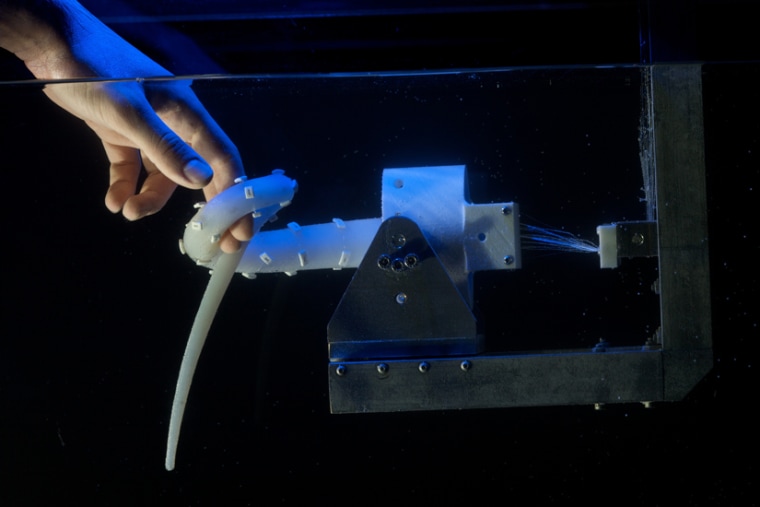One day a giant robotic octopus might save your life. That’s one of the applications a team of European scientists thinks its robotic octopus could have beyond navigating underwater and grasping objects. Recently they took the first step by creating a robotic octopus arm.
"What we want to copy is not just being soft, but it’s being soft and having the capability of controlling the stiffness," said Cecilia Laschi, an associate professor of biorobotics at the Scuola Superiore Sant'Anna in Pisa who is working on the robot.
The arm is part of a larger interdisciplinary European project funded by the European Commission to create a functional full-body octopus robot. The team includes Laschi’s colleagues at the BioRobotics Institute Paolo Dario, Michele Giorelli, and Marcello Calisti, as well as Binyamin Hochner of Hebrew University and Barbara Mazzolai at the Center for Micro-BioRobotics in Pontedera, Italy.
Creating functional soft robots is an enormous challenge because most engineering is based on rigid materials, while the technologies for building compliant structures are not as well developed. Other bio-inspired soft robots have locomotion, but they can’t grasp and manipulate objects like an octopus, Laschi said.
An octopus has a musculature that’s unusual in nature and typically found only in tongues and elephant trunks. The European team studied the octopus’ movement and found that in order to push, the arms shorten and elongate.
Their robotic prototype is about 17 inches long and modeled after a real octopus that inhabits the Mediterranean. The waterproof arm is made from silicone and embedded with a steel cable anchored to a set of nylon cables. By manipulating the cable, the arm can grasp objects. There's enough friction from the silicone exterior that sucker-like components weren't needed.
Although the Octopus Project didn’t start with specific application goals, such a robot could have a number of uses. Laschi said that a team of British surgeons is interested in applying the technology to an endoscope that turns from a soft tool into a hard one that can perform surgery.
"(T)he applications we envisage are all the applications where you send the robot into very small spaces for exploration tasks but also for rescue under debris," Laschi said. A soft octopus-like robot could be controlled remotely to retrieve people in a difficult underwater environment, she added.
The team published details about the arm recently in the journal Bioinspiration & Biomimetics. They plan to complete a full body robotic octopus with eight arms before the project deadline in January 2013.
“This is really the frontier of robotics,” said Barry Trimmer, director of the Tufts Biomimetic Devices Laboratory and a neurobiologist whose caterpillar research has been used to develop soft material robots. “What they’re doing are the first steps toward creating entirely new types of robotic machines.”
Hillel Chiel is a professor of biology, neurosciences and biomedical engineering at Case Western Reserve University whose marine mollusk research has been applied to soft robots. "They have one control, which is the steel cable, so the kinds of manipulations that I think this can do are somewhat limited," he said of the octopus robot.
"The challenge for the future — I don’t think they’ve addressed it yet — is how do you actually control a device that has so many different degrees of freedom?"
He calls the octopus a genius among mollusks in part because its nervous system is human-like. That complexity means we still have a way to go before replicating Paul the Octopus, of World Cup prediction fame.
"If we could do something like that, it would be extremely impressive," Chiel said. "And a little scary."
